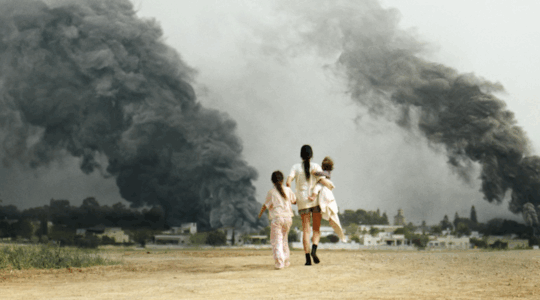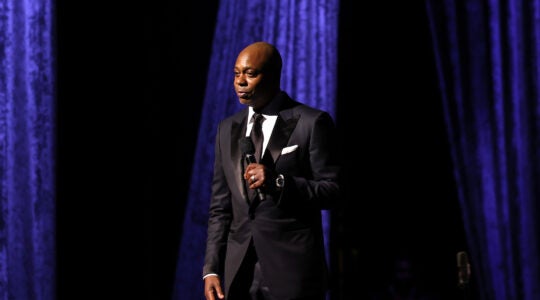Former Pink Floyd frontman Roger Waters is said to have written “The Wall” in 1979 as a metaphor for his internal isolation. But in recent years, he has increasingly politicized the seminal album, particularly to criticize Israel’s polices toward the Palestinians.
In an interview with Rolling Stone on Monday, Waters said the message of “The Wall,” on which he wrote most of the songs, is: “Do you want a voice? And if you do, you better bloody well go out and get it because it’s not going to be handed to you on a plate.”
And last year, Waters told Billboard of the album: “I’ve come to realize it’s not about me. It’s about anybody that has suffered the loss of a loved one in some kind of conflict, whether it be war or something else.”
Connecting “The Wall” to the Israeli-Palestinian conflict isn’t hard. Israel is surrounded by actual walls, or at least fences, most controversially the security barrier with the West Bank. While Israelis credit the security barrier with greatly reducing Palestinian terror attacks on their soil, Palestinians see it as part of an occupation that has made them prisoners in a corner of their own land.
Adopting the Palestinian narrative wholesale, Waters has become one of the most prominent advocates of the Boycott, Divestment and Sanctions movement against Israel — which hopes to use economic pressure to end the occupation. “The Wall” has featured prominently in his advocacy: In 2006, Waters went so far as to spray-paint lyrics from the album on the security barrier.
READ: New York theater offers refunds for Roger Waters concert over his BDS views
Here’s a brief history of how Waters has evolved from a rock star to a political activist — turning “The Wall” from an expression of personal turmoil to an anti-Israel symbol along the way.
Nov. 1979: Release of “The Wall”
Waters had begun to feel disconnected from his fans during Pink Floyd’s previous tour for their album “Animals,” he said in an interview. He said he mined his internal frustrations in writing lyrics for “The Wall.” “The piece on its simplest level is about the situation of a rock concert and feeling alienated from an audience, from the point of view of being on stage,” he said of “Another Brick in the Wall,” a hit song from the album.
July 1990: Berlin Wall performance
Waters had already left Pink Floyd, but in perhaps his first large-scale political act, he performed songs from “The Wall” at the site of the former Berlin Wall, which had fallen just eight months earlier.
Nov. 2005: First full performance of French Revolution opera “Ça Ira”
Waters spent a portion of the late 1980s writing the score for an opera based on the story of the French Revolution. Parts of it were performed in the early 2000s, but its first full performance didn’t come until 2005. Waters’ later rhetoric against Israel incorporated themes from the French Revolution, such as tyranny versus democracy.
June 2006: Performance in Israel and visit to West Bank security barrier
Waters was slated to perform in Tel Aviv, but after visiting the security barrier erected by Israel along its 1967 border with the West Bank, he decided to move his show to Neve Shalom, a cooperative village founded by both Arabs and Jews. He spray-painted the words “We don’t need no thought control” – lyrics from the song “Another Brick In The Wall” from the “Wall” – on the security barrier. “It fills me with horror, the thought of being constrained by something like this,” Waters told Independent Television News at the barrier. “It’s like living in a giant prison.”
April 2010: Release of U.N. film on West Bank barrier, narrated by Waters
Waters narrated “Walled Horizons,” a short film produced by the United Nations in Jerusalem, which sharply criticized the security barrier. “The reason for walls is always fear, whether it’s the personal walls we build around ourselves or walls like this,” Waters says in the film’s opening sequence, alluding to the fence.
Walled Horizons narrated by Roger WatersOn 21 April 2010, the Committee screened “Walled Horizons” at UN Headquarters in New York. The documentary was produced by the UN in Jerusalem to mark five years since the issuance of the International Court of Justice’s Advisory Opinion regarding the separation wall in the Occupied West Bank. The film is narrated by Roger Waters, a founding member of Pink Floyd, who is famous for the song “The Wall.” The film depicts the damaging impact of the separation wall on Palestinians. It was also screened at the UN Meeting of Civil Society in Support of the Palestinian People, held in Vienna on 26 March 2010.
Posted by United Nations Division for Palestinian Rights on Friday, April 23, 2010
Sept. 2010: Controversial new “The Wall” world tour
For the first time since the 1980s, Waters took “The Wall” back on a massive and successful world tour that lasted for about three years. Some of the show’s theatrics – such as juxtaposed projected images of Stars of David and money signs – drew the ire of the Anti-Defamation League, which issued a statement condemning Waters. The former Pink Floyd singer (who played without any of his former bandmates) dressed up on tour in a black jacket with a red armband, an apparent parody of a Waffen SS officer.
March 2011: Waters officially joins BDS movement
“This is not an attack on the people of Israel,” Waters declared in announcing that he was joining the BDS movement in an Op-Ed in the Guardian. “This is, however, a plea to my colleagues in the music industry, and also to artists in other disciplines, to join this cultural boycott.” In the article, he discussed his pivotal visit to the security barrier in 2006 and noted that Palestinian children had chanted lyrics from “Another Brick in the Wall” outside the barrier in 2005.
July 2013: Star of David balloon controversy
At a performance in Belgium, Waters wore a faux-Nazi uniform and pantomimed firing a fake machine gun underneath a large pig-shaped balloon emblazoned with a Star of David. The Simon Wiesenthal Center’s Rabbi Abraham Cooper subsequently called Waters an “open hater of Jews.” “I hold your outburst to be inflammatory and un-helpful and would suggest it can only impede progress towards peace and understanding between people,” Waters responded in a Facebook post.
READ: Bon Jovi at Tel Aviv concert promises to return to Israel
Oct. 2015: Howard Stern rant
After Waters accused Jon Bon Jovi of supporting Jewish terrorists by agreeing to perform in Tel Aviv, Jewish firebrand radio host Howard Stern felt the need to respond. “What is with Roger Waters and the Jews?” Stern said at the beginning of a seven-minute rant on his Sirius XM radio show. “Israel has a tiny little country, and it bugs the s— out of Roger Waters. He can’t f—in’ deal with it.” Waters responded in a Rolling Stone interview that he didn’t want to “waste a single one of [his] precious breaths” addressing Stern’s comments. Bon Jovi went ahead with the concert and told the crowd: “I’ll come here any time you want.”
JTA has documented Jewish history in real-time for over a century. Keep our journalism strong by joining us in supporting independent, award-winning reporting.






